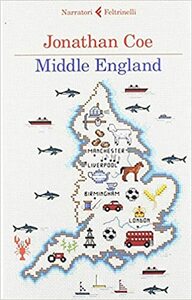Take a photo of a barcode or cover
I really enjoyed this book.
It is a very interesting accout of the years before and just after Brexit and shows very well the whole atmosphere, taking a small group of people as examples.
I particularly liked that it did not split the characters into good and bad or reasonable and unreasonable, but showed them as people with doubts and emotions. It managed to avoid the trap of judgement, which is always easy with that kind of topic.
It is a very interesting accout of the years before and just after Brexit and shows very well the whole atmosphere, taking a small group of people as examples.
I particularly liked that it did not split the characters into good and bad or reasonable and unreasonable, but showed them as people with doubts and emotions. It managed to avoid the trap of judgement, which is always easy with that kind of topic.
emotional
funny
informative
reflective
fast-paced
Plot or Character Driven:
A mix
Strong character development:
No
Loveable characters:
No
Diverse cast of characters:
Yes
Flaws of characters a main focus:
Yes
This book was a treat through and through, it was exactly the kind of book I’d enjoy. The stories of a wide range of different people wove around “middle England” (territory I’ve been weaving around for a while now) whilst experiencing the wider phenomena taking place in the country since 2012. I loved how rooted their stories and conversations were in the mood of the country and the strange societal shifts we’ve been experiencing.
Plus it helps that Coe writes absolutely beautifully and accessibly. He doesn’t criticise but he shows how different people have interpreted political changes in recent years. I loved it and will he seeking out the related prequels he’s written!
Plus it helps that Coe writes absolutely beautifully and accessibly. He doesn’t criticise but he shows how different people have interpreted political changes in recent years. I loved it and will he seeking out the related prequels he’s written!
Didn’t realize it was the third book in a trilogy (received it as a gift). I now need to read the first two books.
I liked this book a lot, especially because there were some of the characters from the Rotter's club and it was like meeting some long forgotten friends whom you really enjoy to see again. The story was not so complicated. but as it was settled from 2010 to now, it was interesting for me to follow what precedes and came right after brexit. After the not so good last book (Numer 11), I enjoyed this new Coe a lot.
Questo libro mi é piaciuto parecchio, anche perché l'ultimo di Coe (Numero 11) non mi era piaciuto poi tanto e inoltre in questo c'erano i vecchi personaggi del Rotter club e mi sembrava quasi di ritrovare dei vecchi amici dei quali uno si dimentica, ma che é felice di rincontrare. La storia non era poi cosí complessa, ma lo sfondo dell'Inghilterra tra il 2010 ed il 2017 rende il tutto molto piú interessante, specialmente alla luce della Brexit. Un piacevole Coe dei vecchi tempi.
Questo libro mi é piaciuto parecchio, anche perché l'ultimo di Coe (Numero 11) non mi era piaciuto poi tanto e inoltre in questo c'erano i vecchi personaggi del Rotter club e mi sembrava quasi di ritrovare dei vecchi amici dei quali uno si dimentica, ma che é felice di rincontrare. La storia non era poi cosí complessa, ma lo sfondo dell'Inghilterra tra il 2010 ed il 2017 rende il tutto molto piú interessante, specialmente alla luce della Brexit. Un piacevole Coe dei vecchi tempi.
Jonathan Coe is one of my favourite contemporary writers, as witness the fact that I bought this in hardback as soon as it came out. So it pains me to say this, but I was really disappointed with it. It's a competent run-through of the years leading up to Brexit, but it completely lacks the savagery and dark satire of What A Carve-Up! and Number 11 -- both of which managed to combine black humour and pathos amid the anger. There is some classic Coe humour here -- I particularly liked Doug and Nigel's meetings -- but it's thin on the ground. The whole novel feels a bit rushed and lacking in plot, just a series of set pieces with rather stereotypical characters (Ian's mum Helena, the worthy Eastern European immigrants to name but three). Some characters appear for one scene and then are simply dropped. Coriander for example: after her riot tourism she is simply used in absentia to accuse Sophie of transphobia, and doesn't appear again. Ian's colleague Naheed seemed like an interesting character, similarly discarded once she'd served her purpose.
Anther fault is that the book is by and large a straight rehash of recent events, from 2010-2018 with little attempt to analyse them deeply. There are flashes of insight here and there of course, and as is his recurring tendency, Coe has plenty to say about the dangers of nostalgia, in most cases for a world that never existed. In Number 11, a character is literally killed by nostalgia, but nothing that dramatic happens here. But characters' sense of loss is cannily manipulated by politicians to achieve their ends.
Benjamin (one of the characters from The Rotters' Club and The Closed Circle) is really quite tiresome -- I realise this is intentional, but it got wearing after a while. And most of the characters seem quite privileged; in the end they appear only mildly inconvenienced by Britain's social convulsions. Even Sophie, a young academic, seems to have no difficulty finding a steady job, hardly typical nowadays, and Grete and Lukas are parachuted into a comfortable rural life. The whole thing needs more bite -- the last chapter, with its heavy symbolism of European togetherness on a terrace in Provence, was actually nauseating in its purple-prosed sickliness, and I never thought I'd say that about Coe. Maybe he should have waited before writing about something that wounded him so deeply. Rounded up to three heavy-hearted stars.
Anther fault is that the book is by and large a straight rehash of recent events, from 2010-2018 with little attempt to analyse them deeply. There are flashes of insight here and there of course, and as is his recurring tendency, Coe has plenty to say about the dangers of nostalgia, in most cases for a world that never existed. In Number 11, a character is literally killed by nostalgia, but nothing that dramatic happens here. But characters' sense of loss is cannily manipulated by politicians to achieve their ends.
Benjamin (one of the characters from The Rotters' Club and The Closed Circle) is really quite tiresome -- I realise this is intentional, but it got wearing after a while. And most of the characters seem quite privileged; in the end they appear only mildly inconvenienced by Britain's social convulsions. Even Sophie, a young academic, seems to have no difficulty finding a steady job, hardly typical nowadays, and Grete and Lukas are parachuted into a comfortable rural life. The whole thing needs more bite -- the last chapter, with its heavy symbolism of European togetherness on a terrace in Provence, was actually nauseating in its purple-prosed sickliness, and I never thought I'd say that about Coe. Maybe he should have waited before writing about something that wounded him so deeply. Rounded up to three heavy-hearted stars.
I absolutely loved this. Yes I wish I had read the first 2 books in the series but this does work as a stand alone and offers many possible reasons for Brexit and how we have become a nasty, divided island
reflective
slow-paced
Plot or Character Driven:
Character
Strong character development:
Yes
Loveable characters:
Yes
Diverse cast of characters:
Yes
Flaws of characters a main focus:
Yes
Non leggevo Coe da tanto, l'avevo un po' trascurato, non avevo letto recensioni lusinghiere su 11 ed ero poco propensa a a prendere in mano un suo romanzo.
Due giorni fa, parlavo con un'amica di lui e di altri autori inglesi che entrambe amiamo molto e ho sentito l'urgenza di leggere Middle England. L'ho trovato bellissimo, mi ha ricordato la Banda dei Brocchi e Circolo Chiuso, il nome dei protagonisti, i Trotter, mi ricordava qualcosa, ma non riuscivo a capire cosa. In effetti, non sapevo quale fosse l'argomento del romanzo e l'ho preso a scatola chiusa. Fatto benissimo! Solo alla fine mi sono ricordata che i fratelli Trotter erano i protagonisti della Banda dei brocchi, anni dopo.
L'atmosfera del romanzo è amara, mostra il progressivo distacco della Gran Bretagna dall'Europa e il cinismo con cui è stato portato avanti il referendum sulla Brexit, il razzismo insito nella società britannica ma anche la speranza che questo cambi, lo scontro politico feroce tra i sostenitori e gli oppositori, che coinvolge gli stessi conservatori che, con leggerezza criminale, hanno coinvolto il paese in una scelta che danneggia milioni di giovani.
E' un romanzo amaro ma con speranza.
"Figlia di genitori pakistani, che vive a Siviglia o a Granada o a Cordova, e parla un perfetto spagnolo, e penso al luminoso futuro che ci aspetta, se così sceglieremo di diventare : un popolo non più impastoiato nei vincoli stretti del sangue o della religione o della nazionalità"
Due giorni fa, parlavo con un'amica di lui e di altri autori inglesi che entrambe amiamo molto e ho sentito l'urgenza di leggere Middle England. L'ho trovato bellissimo, mi ha ricordato la Banda dei Brocchi e Circolo Chiuso, il nome dei protagonisti, i Trotter, mi ricordava qualcosa, ma non riuscivo a capire cosa. In effetti, non sapevo quale fosse l'argomento del romanzo e l'ho preso a scatola chiusa. Fatto benissimo! Solo alla fine mi sono ricordata che i fratelli Trotter erano i protagonisti della Banda dei brocchi, anni dopo.
L'atmosfera del romanzo è amara, mostra il progressivo distacco della Gran Bretagna dall'Europa e il cinismo con cui è stato portato avanti il referendum sulla Brexit, il razzismo insito nella società britannica ma anche la speranza che questo cambi, lo scontro politico feroce tra i sostenitori e gli oppositori, che coinvolge gli stessi conservatori che, con leggerezza criminale, hanno coinvolto il paese in una scelta che danneggia milioni di giovani.
E' un romanzo amaro ma con speranza.
"Figlia di genitori pakistani, che vive a Siviglia o a Granada o a Cordova, e parla un perfetto spagnolo, e penso al luminoso futuro che ci aspetta, se così sceglieremo di diventare : un popolo non più impastoiato nei vincoli stretti del sangue o della religione o della nazionalità"




